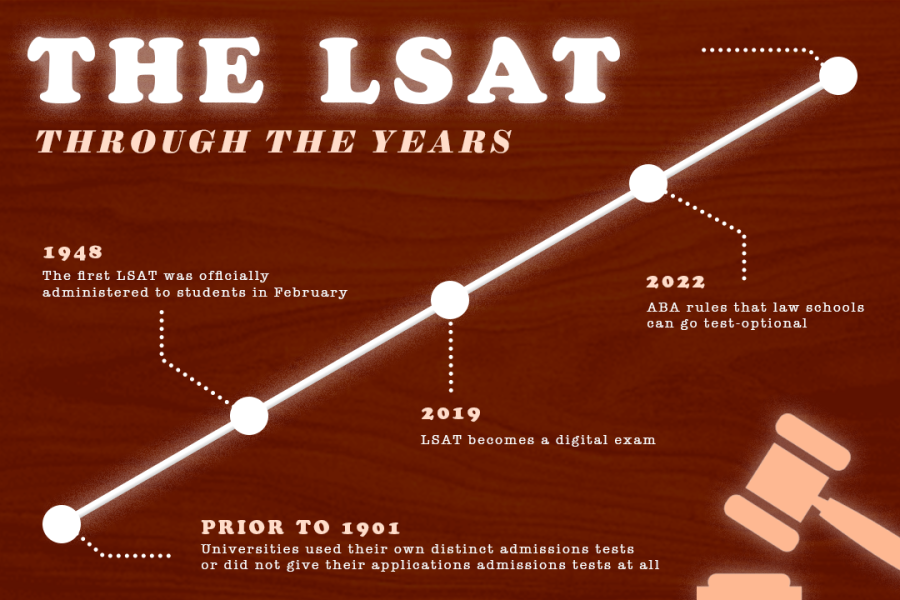ABA Removes LSAT Requirement for Law Schools
Fordham School of Law’s Office of Admissions will assess whether or not to maintain the test requirement following the decision
December 13, 2022
The American Bar Association (ABA) voted to eliminate the Law School Admissions Test (LSAT) as an admissions requirement for law schools across the country on Nov. 18. If the ABA’s House of Delegates approves this motion law schools will be able to go test-optional as soon as fall 2025.
The recent decision comes after a longstanding debate on how the LSAT requirement affects the admittance of a diverse body of students into law schools and legal professions. Critics of the LSAT requirement claim that it serves as a barrier of entry for underprivileged students, while supporters of the exam argue that it acts as an equalizing factor for students of all socioeconomic backgrounds to distinguish themselves in law school admissions.
In a letter written to the ABA against the decision, deans of various law schools, such as Notre Dame, the University of Michigan and the University of Pennsylvania argued that removal of the test requirement would cause law school admissions to place a heavier emphasis on other factors, such as GPA and reputation of undergraduate institutions, that would be “infused with bias.”
Stephen Brown, assistant dean of enrollment at Fordham School of Law, said that, in addition to the LSAT, Fordham Law currently looks at a variety of factors in determining if an applicant will be admitted into its program, including a personal statement, undergraduate GPA, resume and work experience, school and community involvement, and letters of recommendation, among other criteria.
Brown highlighted the importance of looking beyond only LSAT scores and GPA.
“We look to academic success, engagement and leadership, curiosity, perseverance, experiences and many other factors,” Brown said. “That is why we ask for information that is more than just numbers – our students and alumni are more than just numbers.”
Following the ABA’s vote, Brown clarified that the Office of Admissions at Fordham Law will assess whether or not to maintain the test requirement. He explained that the postponement of the implementation for more than two admission cycles will allow the office to examine any changes they might make.
“Like most law students, I hated taking the LSAT. I think it’s fair to say most of us view it as something we just had to endure, like one more hoop to jump through.” Patrick Cucurullo, Fordham School of Law ’23
“We will be evaluating whether to retain an LSAT requirement and, if not, how we will set our application review to assure that we continue to admit students who will be successful and contribute to both the community at Fordham Law and the legal profession,” Brown said.
Patrick Cucurullo, Fordham School of Law ’23, took the LSAT in the summer of 2019 and views the exam as an expected component of the admissions process.
“Like most law students, I hated taking the LSAT,” Cucurullo said. “I think it’s fair to say most of us view it as something we just had to endure, like one more hoop to jump through.”
As a first-generation college and law student in his family Cucurullo appreciated the opportunity the LSAT provided in testing his ability equally.
“I think I tend to be a little more willing to defend the LSAT than the average law student because I don’t come from a background that would give me any advantages going into law school,” he said.
Cucurullo expressed that the elimination of the LSAT requirement is a positive, if not predictable, change, with law schools following the actions of undergraduate colleges.
Cucurullo expressed that he believes the test works as intended in accurately measuring what is required of students in law school. He also theorized that LSAT scores and GPA correlate as he scored around the median on the LSAT for his incoming class and now similarly ranks on GPA. Additionally, Cucurullo commented on the privatized nature of the LSAT ecosystem as being inequitable.
Cucurullo expressed that the elimination of the LSAT requirement is a positive, if not predictable, change, with law schools following the actions of undergraduate colleges.
“Undergraduate schools are already treating the SAT and ACT as optional, and the ‘big’ law schools have been ignoring the LSAT for a while now. I would favor a whole student approach to admissions, so deemphasizing the LSAT is a step in that direction,” he said. “I also think that during the review, schools have to seriously account for the uneven playing field among applicants.”
Pre-law undergraduate students at Fordham also weighed in with their opinions on the recent vote.
Kennedi Hutchins, Fordham College at Lincoln Center (FCLC) ’25, expressed her approval for the vote and stated that the LSAT acts as a roadblock to building diverse legal professions for several reasons, including the lack of access to costly tutors and platforms to prepare for the exam.
“If more LSAT prep courses and other resources were more accessible, then perhaps the LSAT wouldn’t be such an issue regarding the diversity gap in admissions.” Annette Salas, FCLC ’26
She explained that the LSAT is “one of the hardest standardized tests that require time, money, and dedication that some people might not have the privilege to give.”
Hutchins added that this test-optional change might have a side effect similar to that of when the SAT was waived for some undergraduate schools due to COVID-19.
“The number of applications would increase resulting in lower acceptance rates,” she said. “This may have a positive effect on the legal field, but a negative effect on the applicant.”
Another student, Annette Salas, FCLC ’26, commented on the accessibility issues associated with the LSAT. She expressed that limited diversity in law schools and legal professions had less to do with the LSAT itself and more to do with the lack of resources given to minority undergraduate students.
“If more LSAT prep courses and other resources were more accessible, then perhaps the LSAT wouldn’t be such an issue regarding the diversity gap in admissions,” she said.
Salas also noted that she had mixed feelings about the vote and was unsure as to whether or not the elimination of the LSAT was a positive or negative change.
“Despite its emphasis on overlooking education disparities, it struggles to account for differences in access. As such, I feel that the LSAT would be most valuable as a supplement rather than a determinant in law school applications.” Yvette Panaiotov, FCLC ’24
“Personally, I liked the idea of the LSAT because it didn’t put all this pressure only on your grades and resume,” she said. “However, I also see the perspective of taking away the LSAT so admissions can focus on other factors that may offer a more holistic perspective of a student’s qualifications.”
Yvette Panaiotov, FCLC ’24 and head of the Pre-Law Society at Fordham Lincoln Center, discussed the intricacies of the LSAT in comparison to other standardized tests, commending it as a valuable equalizing tool for assessing reasoning and thinking styles over memorization skills. She also expressed concern about law schools placing too much emphasis on GPA as an alternative should the test be eliminated as a requirement.
“Despite its emphasis on overlooking education disparities, it struggles to account for differences in access,” Panaiotov said. “As such, I feel that the LSAT would be most valuable as a supplement rather than a determinant in law school applications.”
Following the ABA council’s approval, the final decision regarding the removal of the LSAT requirement rests upon the judgement of the House of Delegates, which will be determined in February 2023.
Panaiotov finds that a more holistic review of applicants would benefit the admissions process.
In the past, the Pre-Law Society has dedicated most of their events to test prep for the LSAT. Panaiotov commented on how plans for the club will proceed following the vote.
“This decision will certainly create space for us to focus on more areas of law school applications,” she said. “However, we will continue to provide LSAT guidance and instruction for students who wish to supplement their law school applications with their LSAT scores, both before and after the implementation of this decision in 2025.”
Following the ABA council’s approval, the final decision regarding the removal of the LSAT requirement rests upon the judgement of the House of Delegates, which will be determined in February 2023.















nathan • May 19, 2023 at 9:51 pm
I’ve been trying to get in law school since 2006. I took the LSAT in 2006, scored a 133 and again in 2007 and scored a 138. I spent 2k on an LSAT prep course, plus additional materials and did not get in any law school. Money wasted. Fast forward, to today. Law schools accept GRE scores. I scored a 281 which is equivalent to a 143 LSAT score. Again, 17 years after graduating and reapplying to law school, I applied to 8 law schools, got rejected by 8 law schools. I have 20 years of law and govt work experience, graduate of a Paralegal studies program where I learned legal research and writing, I train law clerks who are recent law school graduates, and again, law schools told me no, but in speaking with a recent admission, he confessed that he is a recent parolee but she scored in the 160’s. So they denied me and felt someone who can’t even sit for the bar was a better choice. Make it make sense.
A RODRIGUEZ-RICH • Jan 4, 2023 at 11:03 pm
Interesting 👁